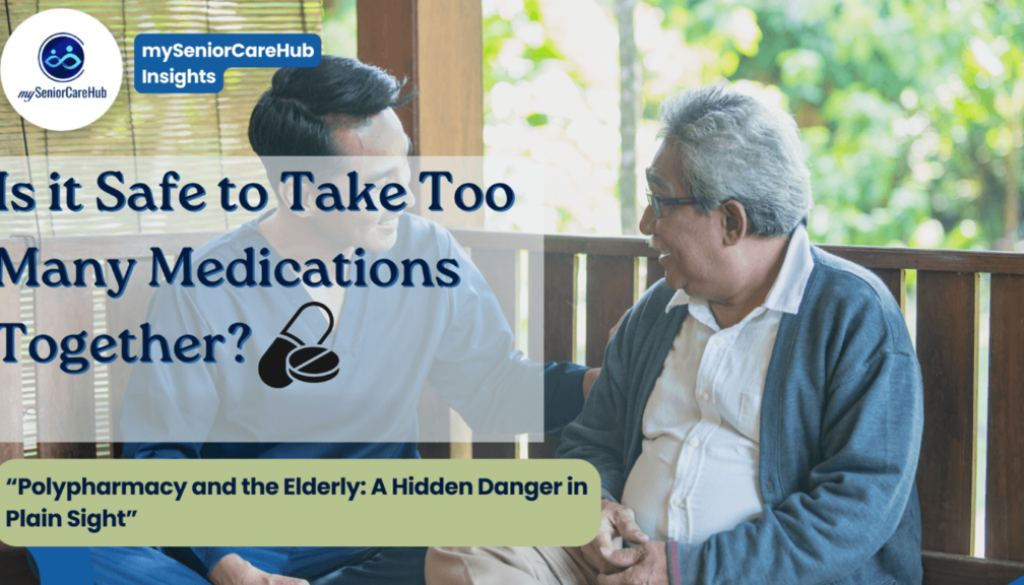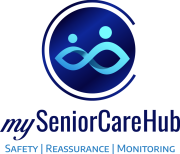Safe or Risky? What Happens When You Mix Multiple Medications
Mixing Medications: A Hidden Risk for Seniors? – Risks of mixing multiple medications
Mrs. Johnson, 73, took five pills before breakfast: one for diabetes, another for high blood pressure, a painkiller, a vitamin, and something for digestion.
By afternoon, she felt dizzy and collapsed.
What happened?
Two medications reacted dangerously and she had no idea.
This is a common case of polypharmacy—the use of multiple medications at once. It’s a growing concern, especially for elderly patients. Thankfully, technology like mySeniorCareHub can help prevent these risks before they become emergencies.
What is Polypharmacy? – Risks of mixing multiple medications
Polypharmacy refers to taking five or more medications daily, including:
- Prescription drugs
- Over-the-counter (OTC) medicine
- Supplements
- Herbal remedies
As we age, health conditions like arthritis, high blood pressure, diabetes, insomnia, and acidity often pile up—and so do the medications. But not all combinations are safe.
Quick Pill Burden Quiz: Are You at Risk? – Risks of mixing multiple medications
Take this short quiz to assess your or your loved one’s risk:
✅ Do you take more than 5 pills a day?
✅ Do you sometimes forget what a medicine is for?
✅ Do you see different doctors for different issues?
✅ Do you use herbal remedies or supplements often?
✅ Have you experienced dizziness, confusion, or a recent fall?
If you answered “yes” to 2 or more, it’s time for a medication review with your doctor—and possibly start using a medication tracking app.
What Can Go Wrong? Common Risks of Mixing Medicines
Here are some real risks of polypharmacy in seniors:
🌀 Dizziness or Confusion
Often triggered by sleep aids, sedatives, or drug interactions.
🥴 Loss of Appetite or Stomach Issues
Painkillers and antibiotics can cause digestive problems—especially when combined.
🧠 Memory Fog or Fatigue
Some psychiatric or heart meds may impact mental clarity.
❌ Taking Two Similar Medications
Example: Mixing two types of painkillers unknowingly = duplicate side effects.
⚠️ Supplements Interfering with Prescriptions
E.g., calcium can reduce absorption of thyroid medication.

5 Questions to Ask Your Doctor About Your Medications
Make your next doctor visit count by asking:
- Do I still need all these medications?
- Can any be stopped, changed, or combined?
- Are there any drug interactions I should know about?
- Could my supplements interfere with prescriptions?
- What side effects should I look out for?
📝 Tip: Bring an updated medication list or use a digital tracker like mySeniorCareHub for easier discussions.
How mySeniorCareHub Helps Prevent Medication Mistakes
mySeniorCareHub is a senior health app that simplifies medication tracking and keeps you or your loved one safe.
💊 Pill Reminders
Never miss a dose again.
📷 Upload Prescriptions
Keep prescriptions stored digitally and accessible anywhere.
📋 Track All Medications in One Place
Avoid dangerous duplicates and overlapping doses.
🧑⚕️ Share Dashboard with Family or Doctors
Improve communication across caregivers, children, and doctors.
⚠️ Missed Dose & Overdose Alerts
Get notified when something seems off.
🚨 Bonus: Fall Detection with GPS
If a fall is detected, the app shares your real-time location with loved ones.
Explore: Fall Detection with Location Alerts
Caregiver Spotlight: Sharon’s Story
“My dad mixed herbal remedies with his diabetes meds—it was affecting his sugar levels. With mySeniorCareHub, we tracked every pill. The doctor discontinued two unnecessary medications after seeing the history.”
— Sharon, 29, caregiver
Apps like mySeniorCareHub help caregivers stay involved—even from a distance.
Final Takeaway
More medicine doesn’t always mean better health.
In fact, polypharmacy could be a silent risk unless actively managed.
Use tools like mySeniorCareHub to track medications, avoid dangerous interactions, and protect your loved one’s well-being—one smart reminder at a time.









